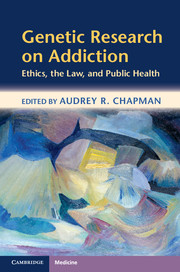Book contents
- Frontmatter
- Contents
- Contributors
- Preface
- Section 1 Introduction
- Section 2 Research ethics
- Section 3 Translating addiction research
- 11 The public health implications of genetic research on addiction
- 12 Genetics, addiction, and stigma
- 13 Lay beliefs about genetic influences on the development of alcoholism: Implications for prevention
- 14 Personalizing risk: How behavior genetics research into addiction makes the political personal
- Section 4 Conclusions
- Index
- References
14 - Personalizing risk: How behavior genetics research into addiction makes the political personal
from Section 3 - Translating addiction research
Published online by Cambridge University Press: 05 September 2012
- Frontmatter
- Contents
- Contributors
- Preface
- Section 1 Introduction
- Section 2 Research ethics
- Section 3 Translating addiction research
- 11 The public health implications of genetic research on addiction
- 12 Genetics, addiction, and stigma
- 13 Lay beliefs about genetic influences on the development of alcoholism: Implications for prevention
- 14 Personalizing risk: How behavior genetics research into addiction makes the political personal
- Section 4 Conclusions
- Index
- References
Summary
Introduction: Addiction, genetics, and the disease model
Addiction is both economically costly and contributes significantly to excess morbidity and mortality (see e.g., Merikangas and Risch, 2003). Although estimates of the total costs of addictive behaviors are by necessity imprecise and subject to much debate, in the United States alone, estimates of economic costs of around half a trillion dollars a year are frequently cited (see Rice, 1999), along with more than half a million excess deaths in the United States per year (see, e.g., Minino and Smith, 2001; MMWR, 2008).
Given these high costs, and the difficulties in successfully treating addictions (see, e.g., Sellman, 2009 and citations therein), there is obvious interest in learning more about the etiology of addiction, with the aim of reducing the costs – both in terms of human suffering and financial costs – of addiction. Studies of the genetic contributions and/or susceptibility to addiction are usually framed as part of this project of ameliorating the costs of addiction. The idea is that if the underlying genetic factors associated with addictive behaviors can be elucidated, then targeted interventions (such as individually tailored pharmaceuticals and/or more focused psychological/therapeutic help) might provide a low(er) cost method of reducing the frequency and impact of addictive behaviors. Alternatively, broad population screening might permit people with particular susceptibilities to addictive behaviors or to particular kinds of addiction (e.g., alcohol) to be warned of their particular risk, and to change their behaviors accordingly. The following examples are illustrative of the tone of much published research on this topic.
- Type
- Chapter
- Information
- Genetic Research on AddictionEthics, the Law, and Public Health, pp. 213 - 231Publisher: Cambridge University PressPrint publication year: 2012



